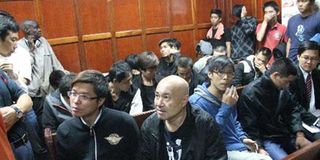Chinese Foreign Minister Wang Yi wants repatriation of citizens held in Kenya

Some of Chinese nationals arrested on December 2, 2014 in Runda, Nairobi, while in possession of illegal communication systems when they appeared in court recently. A court Wednesday declined for the second time to release 37 Asians arrested in connection with cyber-crime. PHOTO | PAUL WAWERU | NATION MEDIA GROUP
What you need to know:
- Mr Yi says once repatriated, the Chinese nationals "will undergo (a) fair trial inside China."
- The 76 Chinese and one Thai were arrested in a house in Runda, Nairobi, with multiple communication gadgets.
- But Mr Eric Mutua, who chairs the Law Society of Kenya, says China should instead support the Kenyan government in trying these suspects.
- Mr Mutua argues that the Chinese government may be using the “fair trial inside China” ploy to have suspects handed over to them and then released later.
Visiting Chinese Foreign Minister Wang Yi may have come to town with an additional promise to boost Kenya’s infrastructure.
But he was also here to argue for the repatriation of the more than 70 Chinese nationals now remanded in Kenya for being in possession of illegal communication systems.
On Saturday, Mr Wang met with President Uhuru Kenyatta at State House, Nairobi where he promised “a new focus on industrial development and technology transfer.”
But the subject changed when the Chinese diplomat met with his Kenyan counterpart Amina Mohamed.
“What we want is to repatriate these citizens so that they will undergo (a) fair trial inside China instead of getting released here in Kenya,” he told reporters during a joint press conference.
“Available evidence shows that this is a case of fraud launched from outside China against Chinese citizens inside China and the suspects used very simple measures. But this is by no means a cyberattack as some media have speculated,” Mr Wang said.
The 76 Chinese and one Thai were arrested in a house in Runda, Nairobi, with multiple communication gadgets.
TELECOMMUNICATION FRAUD
Security agents claimed the hi-tech equipment that was found on the premises was capable of disrupting the country’s communications system and infiltrate bank accounts, the M-Pesa network and ATMs.
The accused have since denied the charge of running a telecommunication system without a licence as well as conspiracy to commit felony.
China argues the Kenyan incident was not isolated as there have been various groups arrested recently in Egypt, Indonesia, Philippines, Vietnam, Thailand, Laos, Malaysia and Singapore with similar equipment.
“Such telecommunication fraud cases have not only happened in Kenya but also in other countries in the region against Chinese citizens inside our country.
"We believe that our law enforcement departments have held close communication and judicial cooperation with each other,” Mr Wang said.
It was not clear what Mr Wang meant by “fair trial inside china.” It could mean Kenya is unable to try them or that Kenya could unfairly convict them. However, lawyers do not agree.
LSK OPPOSES REQUEST
“What they should do is support the Kenyan government in trying these suspects. If the offence was committed in Kenya and is contrary to the laws of Kenya, then Kenya should try them,” Mr Eric Mutua who chairs the Law Society of Kenya told the Nation.
“Unless there is a clear demonstration from the Chinese that we are not competent due, maybe, to the complexities of the crime, I don’t think their argument holds. We are a democratic society with an independent judiciary and the suspects are represented by a lawyer,” Mr Mutua said.
Mr Mutua argues that the Chinese government may be using the “fair trial inside china” ploy to have suspects handed over to them after which they will be released.
Last month, Ms Mohamed told the National Assembly Committee on Defence and Foreign Relations that the suspects had been allowed into the country on a tourist visa.
“They came in as tourists for 30 days. If they wanted to extend their stay, they should have applied for the necessary permits. But nobody followed up on what they were doing in the country,” she said.
LOBBYING FOR RELEASE
But the Chinese government has been lobbying for their release ever since the matter unravelled.
Initially, the Chinese embassy in Nairobi argued the group was part of a syndicate that dupes Chinese citizens to remit money by pretending to work for the government.
But the Chinese were also involved in back-channels to have the suspects released. On Saturday, Mr Wang proposed a type of “judicial cooperation” but Ms Mohamed added the proposal had not been influenced by the suspects’ case.
“We have indeed discussed the issue of cooperation in the judicial field. Because of the level of confidence and trust we have, we have agreed to work together even on the most difficult issues.
“When this matter started unravelling, we quickly started having discussions and have had an exchange of law enforcement officers and sharing of intelligence.”




